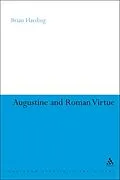Augustine and Roman Virtue seeks to correct what the author sees as a fundamental misapprehension in medieval thought, a misapprehension that fuels further problems and misunderstandings in the historiography of philosophy. This misapprehension is the assumption that the development of certain themes associated with medieval philosophy is due, primarily if not exclusively, to extra-philosophical religious commitments rather than philosophical argumentation, referred to here as the 'sacralization thesis'. Brian Harding explores this problem through a detailed reading of Augustine's City of God as understood in a Latin context, that is, in dialogue with Latin writers such as Cicero, Livy, Sallust and Seneca. The book seeks to revise a common reading of Augustine's critique of ancient virtue by focusing on that dialogue, while showing that his attitude towards those authors is more sympathetic, and more critical, than one might expect. Harding argues that the criticisms rest on sympathy and that Augustine's critique of ancient virtue thinks through and develops certain trends noticeable in the major figures of Latin philosophy.
Autorentext
Brian Harding is Professor of Philosophy at Texas Women's University, USA. He is author of Not Even a God can Save us Now: Reading Machiavelli after Heidegger (2017) and co-editor with Michael R. Kelly of Early Phenomenology: Metaphysics, Ethics and the Philosophy of Religion (Bloomsbury, 2016).
Zusammenfassung
Augustine and Roman Virtue seeks to correct what the author sees as a fundamental misapprehension in medieval thought, a misapprehension that fuels further problems and misunderstandings in the historiography of philosophy. This misapprehension is the assumption that the development of certain themes associated with medieval philosophy is due, primarily if not exclusively, to extra-philosophical religious commitments rather than philosophical argumentation, referred to here as the 'sacralization thesis'. Brian Harding explores this problem through a detailed reading of Augustine's City of God as understood in a Latin context, that is, in dialogue with Latin writers such as Cicero, Livy, Sallust and Seneca. The book seeks to revise a common reading of Augustine's critique of ancient virtue by focusing on that dialogue, while showing that his attitude towards those authors is more sympathetic, and more critical, than one might expect. Harding argues that the criticisms rest on sympathy and that Augustine's critique of ancient virtue thinks through and develops certain trends noticeable in the major figures of Latin philosophy.
Inhalt
Introduction
1. Knowledge of Things, Both Human and Divine
2. Roman Virtue and the Lust for Domination
3. Augustine's Critique of Roman Civic Virtue
4. Augustine's Critique of Philosophical Virtue
5. Reconsidering the Sacralization Thesis
Bibliography
Index
Titel
Augustine and Roman Virtue
Autor
EAN
9781441155054
ISBN
978-1-4411-5505-4
Format
E-Book (pdf)
Hersteller
Herausgeber
Genre
Veröffentlichung
01.09.2008
Digitaler Kopierschutz
Adobe-DRM
Dateigrösse
1.17 MB
Anzahl Seiten
220
Jahr
2008
Untertitel
Englisch
Unerwartete Verzögerung
Ups, ein Fehler ist aufgetreten. Bitte versuchen Sie es später noch einmal.
